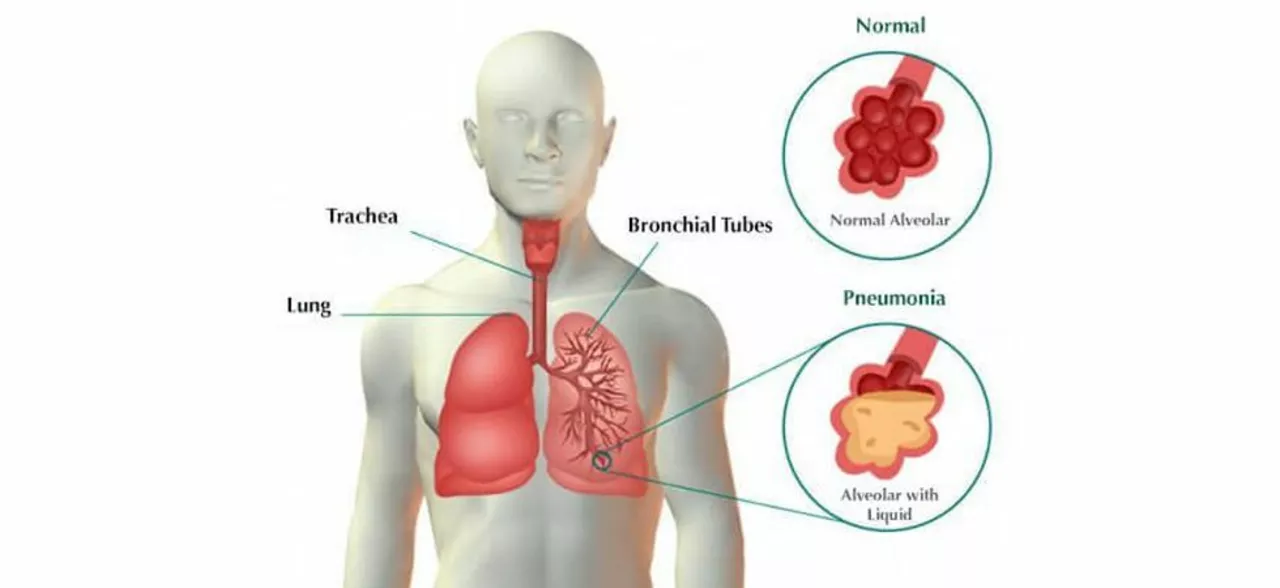Ever felt a chest that won’t quit hurting or a fever that just won’t go down? That could be pneumonia, an infection that settles deep inside your lungs. It’s not as rare as you think, but catching it early makes the difference between a quick recovery and weeks of trouble.
The first clues are usually a cough that brings up phlegm, shortness of breath, and a fever that spikes above 101°F (38.3°C). Some people also get chills, chest pain that worsens when they breathe, or feel unusually tired. If you notice any mix of these signs, especially after a cold or flu, it’s worth getting checked.
Kids and older adults might not show all the classic symptoms. Babies could just seem cranky, while seniors may only have confusion or a mild cough. Trust your gut – if something feels off, call your doctor.
The treatment plan depends on what’s causing the infection. Bacterial pneumonia usually needs antibiotics, and doctors often start you on a broad‑spectrum one until lab tests tell them which bug is responsible. Viral pneumonia, like that caused by flu, won’t respond to antibiotics but may need antivirals if caught early.
Most people recover at home with plenty of rest, fluids, and over‑the‑counter pain relievers for fever and chest discomfort. However, if you’re having trouble breathing, your oxygen level is low, or you have other health conditions (like asthma or heart disease), a hospital stay might be necessary for IV antibiotics and monitoring.
Never skip the full course of medication even if you feel better after a few days. Stopping early can let the infection linger and increase resistance.
The best defense is staying healthy in the first place. Get vaccinated against flu each year and consider the pneumonia vaccine (PCV13 or PPSV23) if you’re over 65 or have chronic illnesses. Hand‑washing, avoiding close contact with sick people, and quitting smoking also cut your risk dramatically.
Keeping your immune system strong helps too. Eat a balanced diet rich in fruits and veggies, stay active, and manage stress. If you catch a cold, treat it promptly – sometimes a simple cough syrup or rest can stop the germs from moving deeper into your lungs.
If you’re caring for someone with pneumonia, wash your hands often, wear a mask if needed, and clean surfaces regularly to keep the infection from spreading.
Don’t wait for symptoms to get worse. Call a healthcare professional right away if you have high fever, chest pain that’s sharp or worsening, trouble breathing, bluish lips or fingertips, or if you’re confused. Those signs could mean the infection is getting serious and needs urgent care.
For kids under two years old, any fever over 100.4°F (38°C) with a cough should be evaluated promptly – babies can deteriorate fast.
Bottom line: pneumonia is common but manageable when you act quickly. Know the signs, follow treatment instructions, and keep your lungs protected with vaccines and healthy habits. Your lungs will thank you.

As a blogger, I want to share some important information about pneumonia and diabetes. Pneumonia is a serious infection that affects the lungs, and people with diabetes have a higher risk of developing it due to their weakened immune systems. It's crucial for diabetics to be aware of the symptoms, such as coughing, fever, and difficulty breathing, and seek medical attention promptly if they suspect pneumonia. Moreover, maintaining good blood sugar control and getting vaccinated for pneumonia can help prevent this dangerous infection. So, let's stay informed and take the necessary precautions to safeguard our health.
Stocking up on parasite meds? Stromectol isn’t your only option. This article lays out nine different alternatives, diving into what makes each one stand out, where they fit in, and some side-by-side tips. Find out who benefits from which drug and what risks to watch for so you can talk to your doc with confidence.
Anaphylaxis is a life-threatening allergic reaction that requires immediate epinephrine. Learn the warning signs, how to use an auto-injector correctly, why antihistamines won’t save you, and what to do after the shot.
As a blogger, I've recently come across the topic of the role of Clozapine in the management of psychotic depression. Clozapine, an atypical antipsychotic medication, is used to treat severe cases of this mental health disorder when other treatments have failed. Its unique properties help in alleviating both psychotic symptoms and depressive episodes. However, it's essential to be aware of the potential side effects and monitor blood levels closely while administering this medication. In conclusion, Clozapine plays a crucial role in managing psychotic depression, improving the quality of life for those who suffer from this challenging condition.
As a dental health enthusiast, I recently learned about the fascinating connection between calcium acetate and dental health. Calcium acetate, a compound found in some dental products, helps to combat tooth decay and promote healthy gums. It works by neutralizing the acids in our mouth, which are responsible for breaking down tooth enamel. Additionally, calcium acetate aids in remineralizing our teeth, making them stronger and more resistant to cavities. Incorporating dental products containing calcium acetate into our oral hygiene routine can significantly improve our overall dental health.
Fibromyalgia can be a tricky condition, marked by widespread pain and fatigue. Vortioxetine, an antidepressant, is showing promise in helping those with fibromyalgia manage their symptoms. By positively affecting neurotransmitter levels, it may offer relief from pain and fatigue, giving patients a better quality of life. This article dives into how vortioxetine works and why it might be a game-changer for fibromyalgia sufferers.